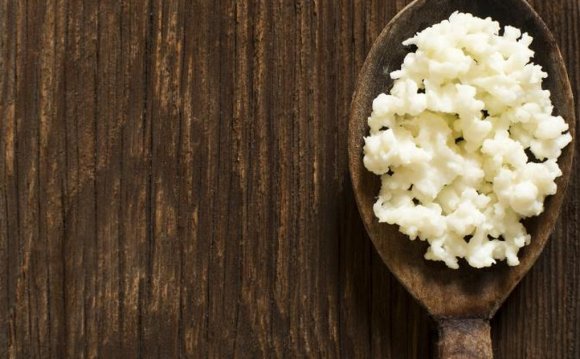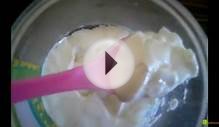
This section is dedicated to the debate regarding kefir grains coming in contact with metal utensils. It is suggested that kefir grains should not come in contact with any metal object. This suggestion is made for both milk kefir-grains and water kefir-grains, or sugary kefir-grains [SKG]. This has become a firm suggestion with myth surrounding the claim, to the point that some folks have taken a strong stand to support this, without further argument- fanatical in fact. The suggestion that kefir grains should never com in contact with metal may be for a few practical reasons. Most importantly, this was quite valid regarding milk kefir-grains in the early 1900s, when the natural mother-culture was first introduced to the rest of the world. Back in those days, many home utensils such as sieves, spoons and pots were not made of stainless steel, a reasonably non-reactive metal.
Because milk kefir-grains are naturally acidic, the organic acids that are part of each kefir grain readily react with reactive metals. The important question is, which metals are reactive in the process of making and storing kefir? The answer is copper, brass, zinc, iron and aluminium are common reactive metals. If milk kefir-grains or kefir come in direct contact with any utensil made from any of the above, metallic ions of that particular metal can leach onto the grains, or into the kefir, where liquid-kefir is stored in containers made from any of these reactive metals. Daily long term ingestion of minute amounts of any heavy metal ion accumulate in the body, and can reach toxic levels.
However, stainless steel is quite inert and kitchen utensils such as sieves, spoons and bowls made from stainless steel are quite suitable for kefir making or for storing either water kefir or milk kefir. However, I personally would not use stainless steel containers to brew or store kefir, but rather use glass containers, for glass is the most inert, non-reactive material.
On the other hand, sugary kefir-grains [SKG] are non-acidic, so there is little to no reaction when SKG come in direct contact with reactive metals.
There were no stainless steel utensils readily available when milk kefir-grains were first introduced to the rest of the world in early 1900s. In this case, it was quite feasible that folks were warned that kefir grains or kefir should not come in direct contact with any [reactive] metal utensil of the day, such as brass, copper or iron strainers, spoons or bowls etc. This would have been to protect the consumer, and not that such metals would impair the quality of kefir grains, as has been claimed by fanatics. However, today, stainless steel kitchen utensils are readily available, so this claim is not as applicable as it once was [taking into account utensils made from reactive metals].
An Added Note for Further Interest or Debate. Under the right conditions, certain metals produce an electric current [electricity] in the presence of an acid. This is the principal behind lead-acid batteries, such as a car-battery produces and stores electricity [lead and lead-dioxide metal plates submerged in sulfuric acid]. In the case with milk kefir-grains, electrons passing through the microflora, due to small electrical current passing through the media when kefir grains are placed in a reactive metal strainer, may have been thought would interfere with respiration of certain organisms e.g., interfering with the entering into the Electron Transport System [ETS] in the Mitochondria of aerobic organisms of kefir grains. Please note that this does not mean that this is the case, but simply a possibility behind why the claim or myth of not letting kefir grains come in direct contact with metal, came about. This is apart from the fact that kefir will become contaminated with metallic ions where kefir is cultured, strained or stored in utensils made from a reactive metal.
Have you ever experienced a week electrical current felt as a subtle metallic taste on the tongue, when you put a metal spoon or fork in your mouth? This week electrical current produced is also the case when placing milk kefir-grains in a metal strainer, or where grains are held in a metal container as an example. A small electrical current is produced when kefir is stored in metal containers [including stainless steel pots and sieves]. As an example, 4 cups of milk kefir stored in a stainless steel bowl produced 150 milli-volts at 30 micro-ampere. In fact, a greater electrical current was produced, when kefir grains were placed in a stainless steel sieve [100gm milk kefir-grains sitting in a large stainless steel sieve, produced 250 milli-volts at 50 micro-ampere]. Under these conditions, such electrical currents *could have been thought would effect the microflora regarding ETS, as explained above.
More valid though, is the effect of electrolysis, which is what leaches metal ions from reactive metal objects such as copper, into the kefir itself. If such metallic elements are ingested regularly over time, the metal accumulates in the body, and long term exposure could reach toxic levels for the individual.
One other point; the mesh of metal strainers can cut into the delicate surface of SKG, which cause unnecessary damage, where SKG can break up into small pieces. Although this does not kill or impair SKG as such, but one can lose amounts of any small piece which easily pass through the mesh. However, this is quite unlikely to occur.
* There is no evidence to claim stainless steel strainers, spoons or other stainless steel utensil will damage or interfere with the microflora of kefir grains. We've used stainless steel strainers to strain kefir for years on end without any evidence to suggest that the grains or the microflora are impaired in any way what so ever.
Unpublished research has shown that culturing kefir-grains in a variety of metal containers, the grains increased more efficiently, compared to a control group. In this research, brass and aluminium [including plastic] containers were used as fermenting vessels. It concluded that culturing kefir grains in milk in brass containers, provided slightly better results in grain growth. However, this research did not evaluate whether or not culturing in metal containers as those mentioned, effected the rhythm of the microflora of kefir grains, or the liquid-kefir. Please note that this experiment was performed for research purpose! It is strictly unsafe to use either brass, aluminium including copper, sliver, zinc, and iron containers to either culture kefir, or, for storing kefir grains or liquid-kefir intended for consumption! Neither is it safe to use strainers made from any of those reactive metals to strain kefir!
The statements above are my personal findings and views unless stated otherwise. This topic is mainly expressed here in this fashion, for possible further debate, of for a better understanding. Especially to try and dispel a common myth that strongly suggests kefir grains should not come in contact with any type of metal. Stainless steel utensils are quite satisfactory and safe.
YOU MIGHT ALSO LIKE











